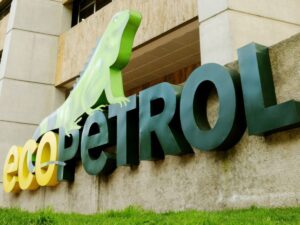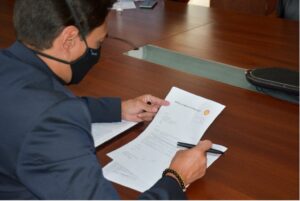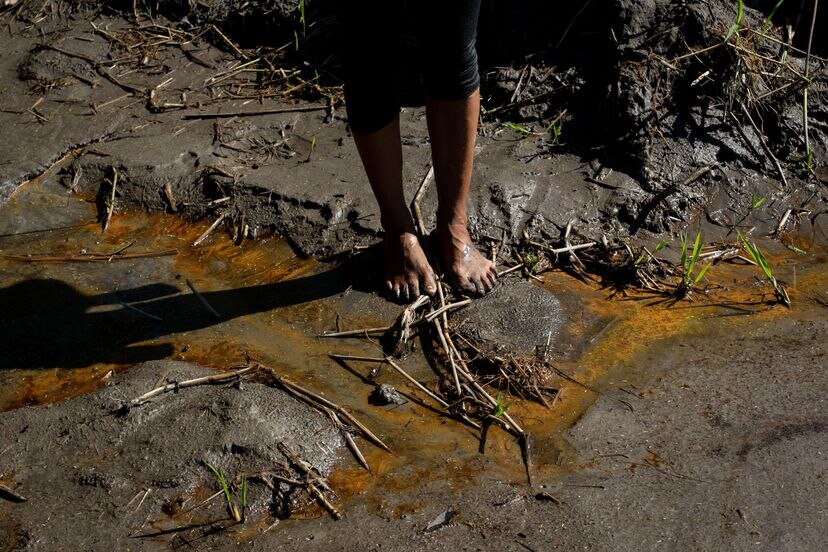
(El Pais, 9.Apr.2021) — The fuel that flowed into the Napo and Coca rivers in the northeastern rainforest of Ecuador more than a year ago caused a humanitarian and ecological disaster. The affected indigenous communities are demanding answers from the authorities and companies that have been reluctant to act
On April 7, 2020 in the Ecuadorian Amazon, the Napo and Coca rivers turned dark with oil and fuel from three ruptured pipelines, producing the worst environmental disaster of the last 15 years. More than 15,000 gallons (almost 57,000 liters) spilled into the rivers, affecting 35,000 people directly and more than 120,000 indirectly, many of them Kichwa indigenous people from 105 communities.
I contacted Olger Gallo, president of the Kichwa community of Panduyaku. “We see oil coming down the riverbed, help us report what is happening,” he said. “The young people went out fishing in the early morning and when they returned their bodies were covered in oil. We need urgent help,” he told me.
The Ecuadorian state did not immediately admit what had happened and it took several hours for it to be made official, but through our own media reporting from the community we already knew in detail what had taken place. Testimonies given by community members allowed us to spread the word and the story was picked up by national media via our digital platforms.
A preventable disaster
Months before, several human-rights organizations had warned the Ecuadorian government about a sinkhole in the San Rafael waterfall, in the upper basin of the Coca River, but their voices were not given due attention. The operators of the Trans-Ecuadorian Oil Pipeline System (known by its Spanish acronym SOTE) and the heavy crude pipeline (operated by private company OCP) did not act given the regressive erosion caused by the collapse of the waterfall, which occurred on February 2, 2020.
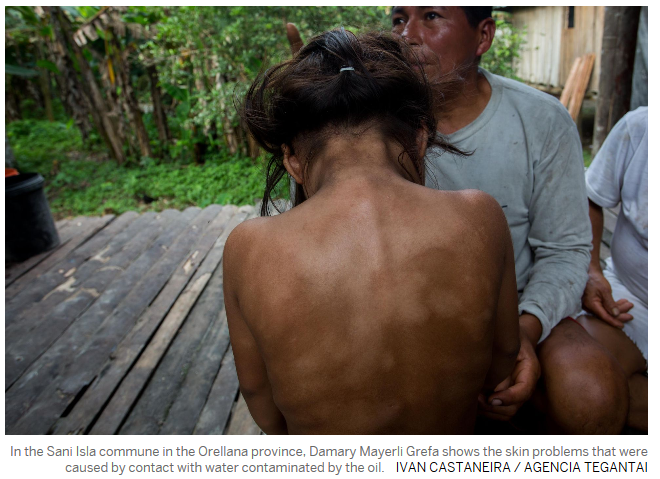
Experts had warned this erosion could occur on multiple occasions during the construction of the Coca Codo Sinclair hydroelectric dam. “We had been telling the Ecuadorian government that it could bring us these problems, but the government never listens to us and now here are the consequences. Now let the president tell us who is going to answer for what happened, especially when we are living through this pandemic,” said Gallo, who watched with frustration as the disaster affected the community.
The spill affected more than 2,000 indigenous families living along the Coca and Napo rivers, contaminating their food source and their cultural and spiritual way of life. The indigenous communities were not told about the spill and went out fishing as normal. They used the river water for everyday tasks and are now affected by skin disease and stomach problems.
Children from 60 communities have such issues with their skin. “The oil stains are for life. We demand that the state repair the damage it caused by its lack of attention. Those who are paying the price are the members of the community. No more impunity or injustice!” said Carlos Jipa, community leader and president of the Federation of United Communes of the Ecuadorian Amazon (FCUNAE in Spanish).
Jipa contacted me because he wanted the world to know about this disaster, and was also seeking legal and organizational support. His organization has decided to file a lawsuit against the Ecuadorian State to demand a cleanup operation and reparations for what has ended up as the second-largest spill in Ecuador’s history.
The Kichwa communities sue the state
On April 29, 2020, we decided to file the lawsuit in view of the damages suffered by several affected people and the Kichwa communities of Orellana. There is a specific request for precautionary measures to stop the kind of damage that has already occurred in relation to rights such as access to water, food, physical and emotional health, integrity, a life of dignity, a healthy environment and the rights of nature.
“We have come to demand justice, because we are tired of our rights being violated every time there are oil spills that affect our communities,” the filing said. “The state has never assumed its responsibility, and that is why today we have come to present this lawsuit to the government so that once and for all it accepts the consequences of its lack of action and lack of attention given to the demands of communities.” We built the claim from Jipa’s testimony and dozens more from community members who decided to break their silence in view of the seriousness of the spill.
A triple pandemic
“To the gentlemen of Petroecuador and OCP,” they wrote, “we have come to claim our rights, enough of this impunity. To the government: listen to the voices our communities have raised. As president of the Toyuca community, I am telling you that at no time has there been any repair of the environmental damages caused by the spill, much less timely attention to our families, women and children. We are completely neglected and you come here to manipulate us by offering a can of sardines, a bag of noodles, when we have lived for millennia with the food source that the river gives us,” said Verónica Grefa, a young community leader from the Kichwa community of Toyuca, one of those affected by the disaster. “But now, we can’t even harvest yucca and plantains from our farms, because even the soil is contaminated with oil,” she added. During the legal process initiated by the communities, the state and the companies tried to generate division among the population in order to clean up their image.
This all occurred against the backdrop of the Covid-19 crisis. We are really talking about a triple pandemic when you account for the health emergency, oil extraction and its consequences, and the historical marginalization of the Amazon region by successive governments.
“Just imagine. We are in the middle of an emergency due to the new coronavirus, confined to our community. But now with the spill, how are we going to feed ourselves if our vegetable gardens are also contaminated, and if we can’t go fishing? We have had to look for food in nearby towns, risking getting infected,” Olger told me on the morning of April 7, after the disaster.
This shows the neglect hundreds of families were facing during the most critical phase of the pandemic, between the months of April and October, but also reveals the historical marginalization of communities in the Amazon rainforest. This is paradoxically the corner of Ecuador from where the wealth that sustains the country’s economy is extracted, and has been for more than 40 years in the northeastern Amazon. Nonetheless, they are still leaving us to deal with events such as the second-largest spill in history in the rainforests of Ecuador.
The communities have been without water and a safe food supply for many months, with their health affected by contamination from the oil, by the pandemic, by a dengue fever outbreak and by the inadequate actions of those responsible: the state, OCP and Petroecuador. The communities affected by the April 7 spill are at imminent risk of new catastrophes, since the process of regressive erosion has accelerated and has already produced new landslides. There is still no early-warning plan in the event of another disaster.
Mobilization
Despite all this injustice, the communities will not stop their search for truth and justice. On September 1, the Ecuadorian courts rejected their petition for protection as “inadmissible,” but on October 15, the Kichwa communities filed an appeal against this unjust and absurd decision of the Orellana provincial court.
The appeal was delivered with 15,000 signatures in support of the process as “amicus curiae” (someone who is not directly implicated in a case but assists a court by offering information or expertise), including people from all over the world. The communities also held dozens of protests to make their voices heard, not only in Orellana, but also across Ecuador and the whole world.
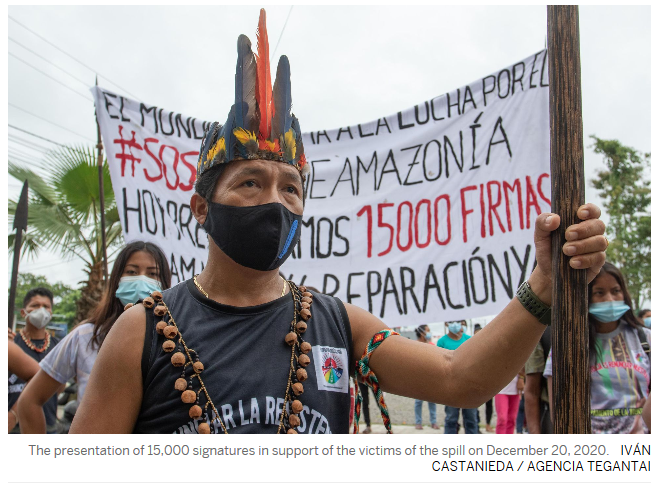
“We urge we be given a fair and transparent legal hearing where the voice of those affected is heard. The justice system must face 27,000 affected Kichwas. The world is watching #SOSSpillAmazon. National and international celebrities, such as Leonardo DiCaprio, have criticized the state and the judges in order to achieve justice and give a fair hearing to the victims,” said Carlos and Verónica, together with indigenous leaders and human rights lawyers.
A year has passed, but 120,000 people, including 27,000 indigenous people, continue to face the pandemic without water or safe food. The rivers, their crops and even their own bodies have been horribly affected. Many of us have joined the struggle of the Amazonian Kichwas for justice and full reparations, and we ask the new court sitting to break the historical cycle of impunity.
It is in the judges’ hands to act fairly and give the victims their livelihoods back, while demanding full reparations from the state and the companies responsible. This violation of the rights of communities and nature by unscrupulous oil companies cannot go unpunished.
____________________
Andrés Tapia is communications director at Confeniae – Lanceros Digitales. This story is part of of the documentary series ‘Glimpses of the Amazon’ produced in the Amazon by democraciaAbierta. The series is supported by the Rainforest Journalism Fund from the Pulitzer Center. We would like to thank the communities portrayed in this story for the testimony and graphic material that they provided.
